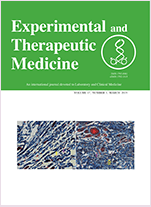Red Blood Cell Count
How to submit an article:
- Registered users can submit any published journal article that has a unique DOI (Digital Object Identifier) name or link to Research Hub.
- For example, you can paste the full DOI link:
https://doi.org/10.1109/5.771073or just the DOI name:10.1109/5.771073into the field above and click submit. - The person who is first to submit a valid article to Research Hub will forever be credited for it, and every article submission earns you +6 Research Points.
Published research studies are articles that present the findings of original research that has undergone a peer-review process and has been made publicly available in scholarly journals, books or other media.

The effect of acupuncture and selection of acupoints on myelosuppression after chemotherapy
2022 Jan TMR Non-Drug Therapy Wang XZ, Zhang XY, Zhang YN, Xia L
Acupuncture significantly inhibited the decline in blood cell components (white blood cell count, platelet count, red blood cell count, and hemoglobin) except for neutrophils in patients with myelosuppression after chemotherapy. Acupoints, mainly from the bladder meridian, stomach meridian, and spleen meridian, were distributed in the limbs and back. Specific points such as ST36 and SP6 were frequently used, with ST36-SP6-RN6-SP10-RN4 identified as a central combination in acupuncture prescriptions for this population.
Systematic Review Meta-Analysis Acupuncture Myelosuppression
Effect of pomegranate juice consumption on biochemical parameters and complete blood count
2017 Jun 27 Experimental and Therapeutic Medicine Manthou E, Georgakouli K, Deli CK, Sotiropoulos A, Fatouros IG, Kouretas D, et al.
Randomised Controlled Trial Haemoglobin Red Blood Cell Count Iron Deficiency PomegranatePomegranate juice consumption over a short period promotes red blood cell production without significantly changing metabolic health and inflammation markers in healthy individuals.
Research insights are moderated by the Research Hub team and offer an at-a-glance overview of interesting research findings.

2017 Experimental and Therapeutic Medicine
Pomegranate juice consumption over a short period promotes red blood cell production without significantly changing metabolic health and inflammation markers in healthy individuals.
Randomised Controlled Trial Haemoglobin Iron Deficiency Pomegranate
Effect of pomegranate juice consumption on biochemical parameters and complete blood count
Manthou E, Georgakouli K, Deli CK, Sotiropoulos A, Fatouros IG, Kouretas D, et al.
Review Articles
Review articles summarise and critically evaluate the current state of research on a specific topic or field by synthesising multiple primary research studies.
Clinical Trials
Clinical trials are research studies that involve people and are conducted to evaluate the safety and efficacy of new treatments or interventions, such as drugs, medical devices, or behavioural therapies.
Study Protocols
Published study protocols are detailed plans that outline the objectives, methodology, statistical analyses, and organisation of a research study that have been made publicly available for others to review and use as a reference.
Presentation Slides

Randomised Controlled Trial
Pomegranate juice consumption over a short period promotes red blood cell production without significantly changing metabolic health and inflammation markers in healthy individuals.
Manthou E, Georgakouli K, Deli CK, Sotiropoulos A, Fatouros IG, Kouretas D, Haroutounian S, Matthaiou C, Koutedakis Y, Jamurtas AZ
Executive Summary
Write an executive summary in the form of a blog article on the topic of "Research into Chinese medicine treatment for Red Blood Cell Count" summarising the research below and using language that can be easily understood by patients and avoiding medical jargon using a professional and caring tone of voice.
Write an executive summary in the form of a blog article on the topic of "Researched Chinese medicine treatments for Red Blood Cell Count" summarising the research below in an objective and easy to understand way, and using language that can be easily understood by patients. Group the article into Chinese medicine treatments first, followed by nutrition and other treatments. Avoid using medical jargon and use a professional and caring tone of voice.
Write me a concise but easy to understand executive summary on the topic of "Chinese medicine treatments for Red Blood Cell Count" based on the following research that I will give you. Your summary should be 2 paragraphs long in Australian English spelling and include references to the studies.
A Randomised Controlled Trial published in 2017 in the journal Experimental and Therapeutic Medicine found that Pomegranate juice consumption over a short period promotes red blood cell production without significantly changing metabolic health and inflammation markers in healthy individuals. In the methodology of this study, ten healthy subjects (five males and five females averaging 31.8 years of age and weighing an average of 66.2 kg) were split into two groups. One group drank 500 ml of pomegranate juice every day for 14 days, while the other did not. Blood samples were taken from the subjects before and after the experimental period to measure various health markers. In the discussion of results, it was observed that pomegranate juice intake led to a substantial rise in red blood cell count, hemoglobin levels, and hematocrit levels. However, other complete blood count parameters, and levels of glucose, cholesterol, triglycerides, high-density lipoprotein, low-density lipoprotein, and C-reactive protein remained largely unaffected after the juice consumption. This suggests that pomegranate juice only had a substantial effect on increasing erythropoiesis or decreasing degradation in healthy individuals.
Moderation Tools
Topic
Sign In
Users not signed in are limited to viewing the 5 most recent items of content.